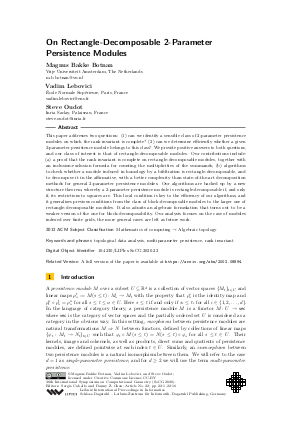On Rectangle-Decomposable 2-Parameter Persistence Modules
Authors Magnus Bakke Botnan, Vadim Lebovici, Steve Oudot
-
Part of:
Volume:
36th International Symposium on Computational Geometry (SoCG 2020)
Part of: Series: Leibniz International Proceedings in Informatics (LIPIcs)
Part of: Conference: Symposium on Computational Geometry (SoCG) - License:
 Creative Commons Attribution 3.0 Unported license
Creative Commons Attribution 3.0 Unported license
- Publication Date: 2020-06-08
File

PDF
LIPIcs.SoCG.2020.22.pdf
- Filesize: 0.55 MB
- 16 pages
Document Identifiers
Related Versions
-
A full version of the paper is available at https://arxiv.org/abs/2002.08894.
Subject Classification
ACM Subject Classification
- Mathematics of computing → Algebraic topology
Keywords
- topological data analysis
- multiparameter persistence
- rank invariant
Metrics
- Access Statistics
-
Total Accesses (updated on a weekly basis)
0Document
0Metadata
Abstract
This paper addresses two questions: (1) can we identify a sensible class of 2-parameter persistence modules on which the rank invariant is complete? (2) can we determine efficiently whether a given 2-parameter persistence module belongs to this class? We provide positive answers to both questions, and our class of interest is that of rectangle-decomposable modules. Our contributions include: (a) a proof that the rank invariant is complete on rectangle-decomposable modules, together with an inclusion-exclusion formula for counting the multiplicities of the summands; (b) algorithms to check whether a module induced in homology by a bifiltration is rectangle-decomposable, and to decompose it in the affirmative, with a better complexity than state-of-the-art decomposition methods for general 2-parameter persistence modules. Our algorithms are backed up by a new structure theorem, whereby a 2-parameter persistence module is rectangle-decomposable if, and only if, its restrictions to squares are. This local condition is key to the efficiency of our algorithms, and it generalizes previous conditions from the class of block-decomposable modules to the larger one of rectangle-decomposable modules. It also admits an algebraic formulation that turns out to be a weaker version of the one for block-decomposability. Our analysis focuses on the case of modules indexed over finite grids, the more general cases are left as future work.
Cite As Get BibTex
Magnus Bakke Botnan, Vadim Lebovici, and Steve Oudot. On Rectangle-Decomposable 2-Parameter Persistence Modules. In 36th International Symposium on Computational Geometry (SoCG 2020). Leibniz International Proceedings in Informatics (LIPIcs), Volume 164, pp. 22:1-22:16, Schloss Dagstuhl – Leibniz-Zentrum für Informatik (2020)
https://doi.org/10.4230/LIPIcs.SoCG.2020.22
BibTex
@InProceedings{botnan_et_al:LIPIcs.SoCG.2020.22,
author = {Botnan, Magnus Bakke and Lebovici, Vadim and Oudot, Steve},
title = {{On Rectangle-Decomposable 2-Parameter Persistence Modules}},
booktitle = {36th International Symposium on Computational Geometry (SoCG 2020)},
pages = {22:1--22:16},
series = {Leibniz International Proceedings in Informatics (LIPIcs)},
ISBN = {978-3-95977-143-6},
ISSN = {1868-8969},
year = {2020},
volume = {164},
editor = {Cabello, Sergio and Chen, Danny Z.},
publisher = {Schloss Dagstuhl -- Leibniz-Zentrum f{\"u}r Informatik},
address = {Dagstuhl, Germany},
URL = {https://drops.dagstuhl.de/entities/document/10.4230/LIPIcs.SoCG.2020.22},
URN = {urn:nbn:de:0030-drops-121802},
doi = {10.4230/LIPIcs.SoCG.2020.22},
annote = {Keywords: topological data analysis, multiparameter persistence, rank invariant}
}
Author Details
References
-
Gorô Azumaya. Corrections and supplementaries to my paper concerning Krull-Remak-Schmidt’s theorem. Nagoya Mathematical Journal, 1:117-124, 1950.

- Ulrich Bauer, Magnus B Botnan, Steffen Oppermann, and Johan Steen. Cotorsion torsion triples and the representation theory of filtered hierarchical clustering. arXiv preprint, 2019. URL: http://arxiv.org/abs/1904.07322.
-
Paul Bendich, Herbert Edelsbrunner, Dmitriy Morozov, Amit Patel, et al. Homology and robustness of level and interlevel sets. Homology, Homotopy and Applications, 15(1):51-72, 2013.

-
Magnus Bakke Botnan. Interval decomposition of infinite zigzag persistence modules. Proceedings of the American Mathematical Society, 145(8):3571-3577, 2017.

- Magnus Bakke Botnan and William Crawley-Boevey. Decomposition of persistence modules. To appear in the Proceedings of the AMS, 2018. URL: http://arxiv.org/abs/1811.08946.
- Magnus Bakke Botnan, Vadim Lebovici, and Steve Oudot. On rectangle-decomposable 2-parameter persistence modules, 2020. URL: http://arxiv.org/abs/2002.08894.
-
Gunnar Carlsson and Vin De Silva. Zigzag persistence. Foundations of computational mathematics, 10(4):367-405, 2010.

-
Gunnar Carlsson, Vin De Silva, and Dmitriy Morozov. Zigzag persistent homology and real-valued functions. In Proceedings of the twenty-fifth annual symposium on Computational geometry, pages 247-256. ACM, 2009.

-
Frédéric Chazal, Vin De Silva, Marc Glisse, and Steve Oudot. The structure and stability of persistence modules. Springer, 2016.

- Jérémy Cochoy and Steve Oudot. Decomposition of exact pfd persistence bimodules. Discrete and Computational Geometry, 2019. To appear, currently available as arXiv preprint URL: https://arxiv.org/abs/1605.09726.
-
David Cohen-Steiner, Herbert Edelsbrunner, and John Harer. Stability of persistence diagrams. Discrete & Computational Geometry, 37(1):103-120, 2007.

-
William Crawley-Boevey. Decomposition of pointwise finite-dimensional persistence modules. Journal of Algebra and its Applications, 14(05):1550066, 2015.

-
Tamal K Dey and Cheng Xin. Generalized persistence algorithm for decomposing multi-parameter persistence modules. arXiv preprint arXiv:1904.03766, 2019.

-
Herbert Edelsbrunner and John Harer. Persistent homology-a survey. Contemporary mathematics, 453:257-282, 2008.

-
Emerson G Escolar and Yasuaki Hiraoka. Persistence modules on commutative ladders of finite type. Discrete & Computational Geometry, 55(1):100-157, 2016.

- Peter Gabriel. Unzerlegbare Darstellungen I. manuscripta mathematica, 6(1):71-103, March 1972. URL: https://doi.org/10.1007/BF01298413.
-
Woojin Kim and Facundo Memoli. Generalized persistence diagrams for persistence modules over posets. arXiv preprint arXiv:1810.11517, 2018.

-
Michael Lesnick and Matthew Wright. Computing minimal presentations and betti numbers of 2-parameter persistent homology. arXiv preprint arXiv:1902.05708, 2019.

-
Nikola Milosavljević, Dmitriy Morozov, and Primoz Skraba. Zigzag persistent homology in matrix multiplication time. In Proceedings of the twenty-seventh annual symposium on Computational geometry, pages 216-225. ACM, 2011.

-
Steve Y Oudot. Persistence theory: from quiver representations to data analysis, volume 209. American Mathematical Society Providence, RI, 2015.

